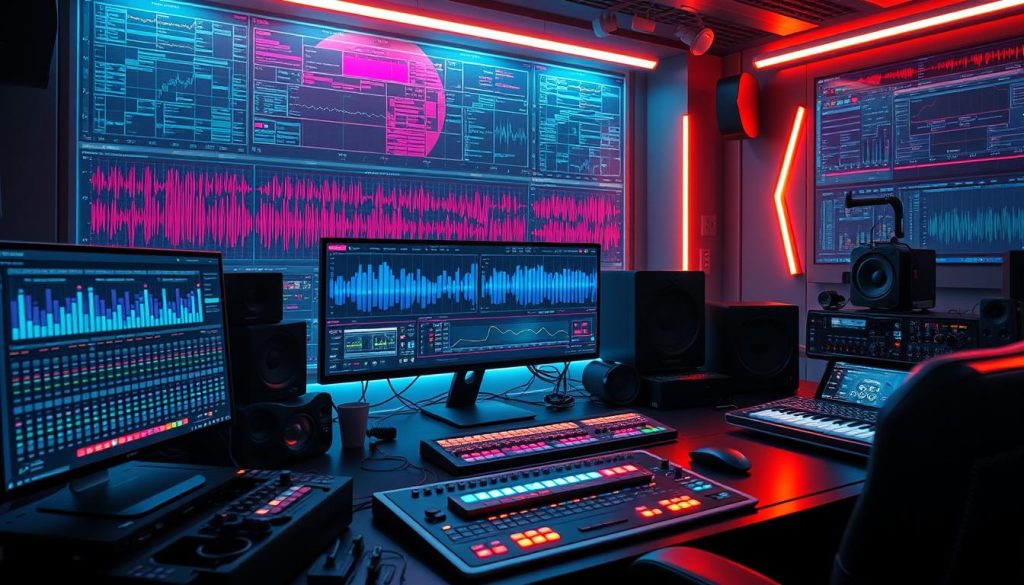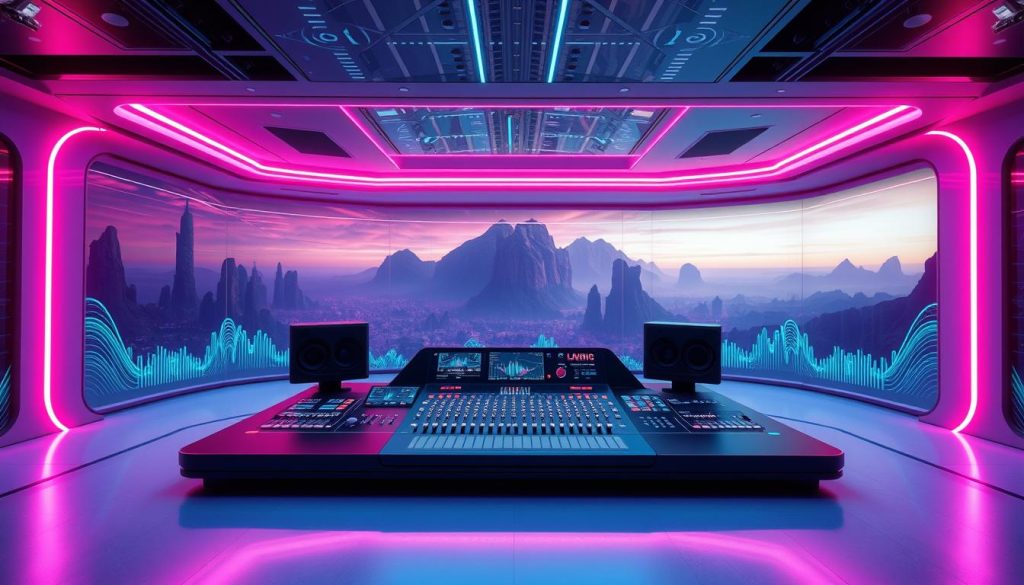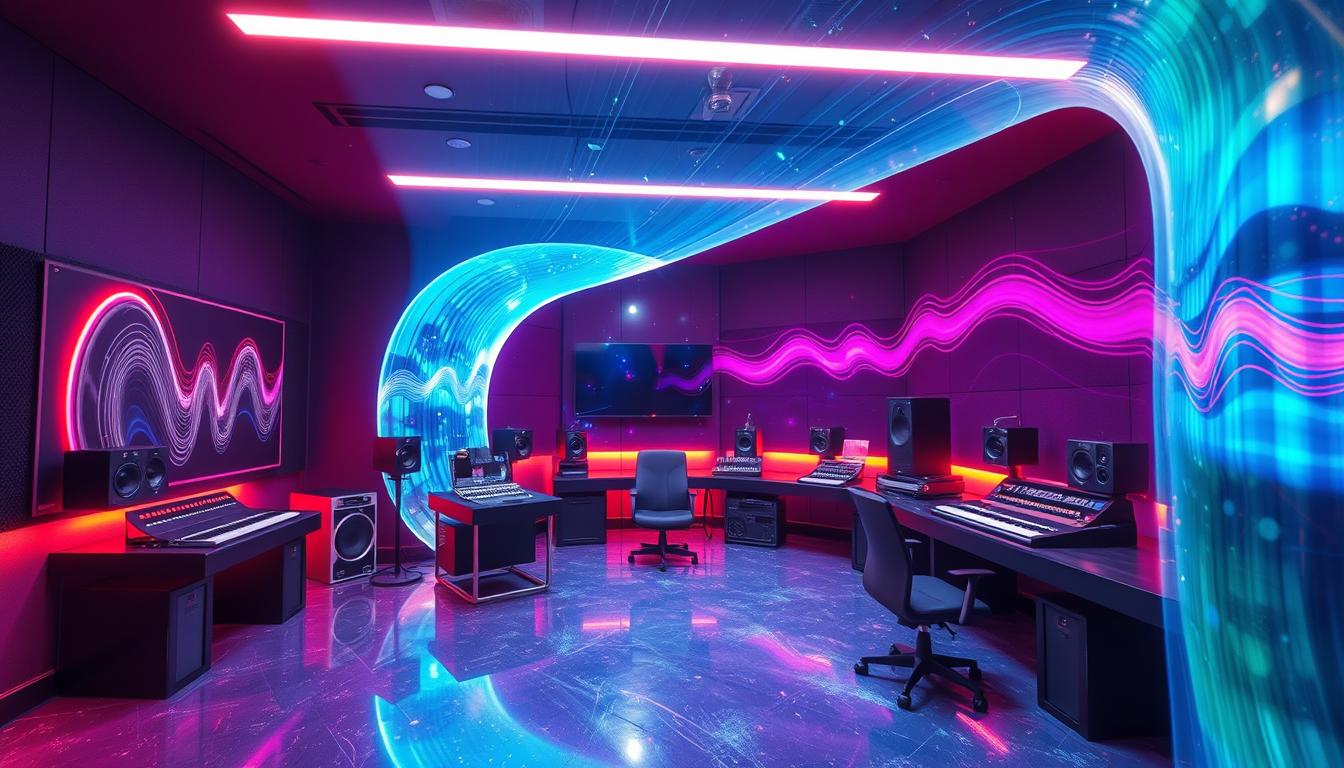As an audio engineer, I’m excited to see how fast our industry is changing. The future looks bright, with new tech and ideas changing how we make and hear music. Things like spatial audio and AI in music production are making big changes.
One big trend is spatial audio. It makes sound come alive in three dimensions. This tech is changing how we hear music in VR and AR, and making games and shows more immersive.
But there’s more. Artificial intelligence is changing the game too. It helps with making music, creating sounds, and even mixing and mastering tracks. This AI is making music production faster and more creative.
Audio plugins are also getting better, offering sounds like old gear and real-time effects. With more powerful computers, studios are getting more precise and creative.
Virtual reality mixing rooms are something I’m really looking forward to. They let us mix music in a 3D world. This could open up new ways to be creative.
The future of sound engineering is exciting. With things like spatial audio and AI, the possibilities are endless. I’m excited to see what comes next in our field.
The Rise of Spatial Audio: Adding a New Dimension to Sound
Spatial audio has changed how we hear sound. It puts sounds in a virtual space, making listening fun and engaging. This tech is key in virtual and augmented reality, making experiences more real and fun.
Immersive Experiences in Virtual and Augmented Reality
Virtual and augmented reality use spatial audio a lot. It makes sounds come alive in a real way. This makes users feel like they’re really in a new world, whether it’s a game or a virtual place.
Enhancing Gaming and Entertainment with 3D Soundscapes
Gaming loves spatial audio for its immersive soundscapes. It makes games feel more real by placing sounds in space. This tech isn’t just for games; it’s also in movies and concerts, giving us a theater-like sound.
With tech giants like Apple adding this to their products, the future of sound is bright. We can expect even more amazing audio experiences.
Artificial Intelligence: The Game-Changer in Music Production
The music production world is changing fast, thanks to AI technology. AI is changing how we make, mix, and master music. It opens up new ways to be creative and work more efficiently.
AI-Powered Composition and Sound Generation
AI tools are changing how we make music. They look at huge amounts of music to make new songs. This lets artists try out new sounds and be more creative.
AIVA is an AI music platform that uses machine learning. It makes music that feels deep and moving. AIVA learns from famous composers to make songs that touch many emotions.
Machine Learning for Mixing, Mastering, and Trend Prediction
AI and machine learning are also changing music production’s technical side. They can find the best levels and effects for music. By learning from many recordings, AI tools can make music sound better and more appealing.
AI is also great at predicting what music will be popular. It looks at what people like to listen to. This helps producers make music that will connect with their audience.
AI in music production is a big deal. It helps artists, engineers, and the music industry be more creative and innovative. As AI gets better, the future of music looks very exciting.
The future of sound engineering: Advancements in Audio Plugins

The digital revolution is changing audio engineering fast. Audio plugins are getting better, making it easier for pros and hobbyists to make and change sounds. These tools add special features to audio systems.
Digital Emulation of Vintage Hardware
Now, we can make sounds like old hardware without the need for big, expensive gear. Plugins let us get the warm tones of classic compressors and the unique sounds of old preamps. This is great news for audio engineers.
Real-Time Processing with Increased Computing Power
Computers are getting faster, which helps audio plugins a lot. Now, engineers can work on more tracks at once and use complex plugins without slowdowns. This means they can make music and sound effects in real-time, making their work more efficient and creative.
Thanks to these changes, making high-quality music is easier for everyone. From beginners to pros, more people can now create great audio. As technology keeps improving, we’ll see even more amazing audio plugins that will change how we make and enjoy sound.
Virtual Reality Mixing Rooms: Redefining the Studio Experience

Virtual reality (VR) is changing the audio engineering world. VR mixing rooms are making the studio experience more immersive and interactive. They let audio engineers create and mix audio in a new way.
In a VR mixing room, engineers get to work in a digital studio that feels like a real one. They can use all the tools and controls they need, just like in a real studio.
VR mixing rooms offer many benefits. They give engineers more control and flexibility than a physical studio. Engineers can try out different room setups and sound treatments easily. They can also fine-tune their mixes with great precision.
Also, VR makes it easy to work with people from all over the world. Engineers can collaborate in the same virtual studio, no matter where they are. This opens up new ways for global teams to work together on audio projects.
As VR technology gets better and more common, VR mixing rooms will likely become more important in audio engineering. This new technology could change how audio professionals work together and improve their skills.
AI-Assisted Mixing: The Future of Audio Production
The audio production world is changing fast, thanks to AI and machine learning. AI-assisted mixing tools are leading this change. They are set to change how we mix audio.
These new tools make mixing easier. They help audio engineers focus on being creative. AI looks at audio tracks and suggests how to adjust levels and balance the mix. It can even do some mixing tasks on its own.
This automation can make mixing more efficient and precise. As AI gets better, these tools will give more tailored advice. Some worry AI will replace human engineers. But, it’s more likely to help them do their jobs better.
Using AI in mixing is a big step forward for sound engineering. It lets audio pros be more creative and efficient. This opens up a new era of audio excellence.
The Benefits of AI-Assisted Mixing
- Streamlined mixing process, freeing up time for creative work
- Intelligent suggestions for level adjustments, balance, and automation
- Increased precision and consistency in the mixing workflow
- Personalized recommendations based on machine learning algorithms
- Complementary to the skills and expertise of human audio engineers
| Feature | Description |
|---|---|
| Automated Level Adjustments | AI-powered mixing tools can analyze audio tracks and provide recommendations for adjusting levels to achieve the optimal balance. |
| Intelligent Panning and Positioning | These tools can suggest the best way to place sounds in a mix for a full and immersive sound. |
| Dynamic Compression and EQ | AI-assisted mixing can adjust compression and equalization automatically for a polished sound. |
| Trend Prediction | Machine learning looks at trends to suggest mixing techniques that fit current and future styles. |
As the audio production world changes, AI-assisted mixing will be key. It will bring new efficiency, creativity, and precision to the job. This will start a new era of audio excellence.
Environment-Adaptive Music and Ultra-Fast Sound Editing
I’m thrilled about the future of audio engineering. We’re seeing big steps forward in environment-adaptive music and ultra-fast sound editing. Imagine music that changes to fit the room or the listener’s mood. This tech could change how we hear and enjoy music.
Ultra-fast sound editing tools are also changing the game. They make our work faster and more efficient. These tools automate tasks, letting us focus on creativity. With smart editing and automated processing, our work will be faster and more precise.
These innovations are exciting for audio engineering’s future. They bring us into a new era of audio. I’m looking forward to seeing how they’ll change music and audio production.

